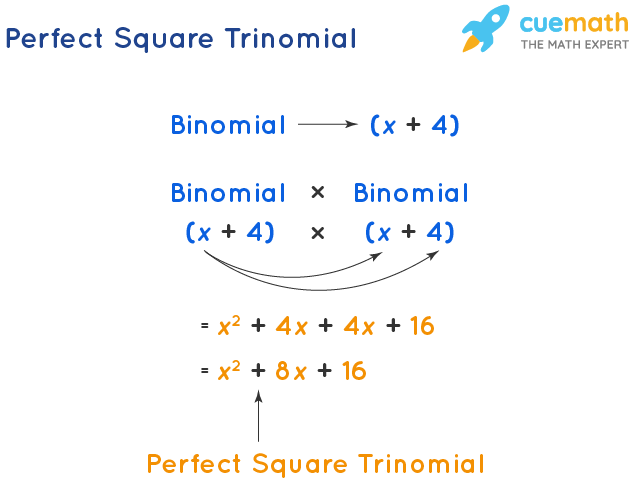Perfect Square Trinomial
Perfect square trinomials are algebraic expressions with three terms that are obtained by multiplying a binomial with the same binomial. A perfect square is a number that is obtained by multiplying a number by itself. Binomials are algebraic expressions consisting of just two terms that are either separated by a positive (+) or a negative (-) sign. Similarly, trinomials are algebraic expressions consisting of three terms. When a binomial consisting of a variable and a constant is multiplied by itself, it results in a perfect square trinomial having three terms. The terms of a perfect square trinomial are separated by either a positive or a negative sign.
| 1. | Perfect Square Trinomial Definition |
| 2. | Perfect Square Trinomial Pattern |
| 3. | How to Factor a Perfect Square Trinomial? |
| 4. | Perfect Square Trinomial Formula |
| 5. | Perfect Square Trinomial FAQs |
Perfect Square Trinomial Definition
A perfect square trinomial is defined as an algebraic expression that is obtained by squaring a binomial expression. It is of the form ax2 + bx + c. Here a, b, and c are real numbers and a ≠ 0. For example, let us take a binomial (x+4) and multiply it to (x+4). The result obtained is x2 + 8x + 16. A perfect square trinomial can be decomposed into two binomials and the binomials when multiplied with each other gives the perfect square trinomial.

Perfect Square Trinomial Pattern
Perfect square trinomial generally has the pattern of a2 + 2ab + b2or a2 - 2ab + b2. Given a binomial, to find the perfect square trinomial, we follow the steps given below. They are,
- Step 1: Find the square the first term of the binomial.
- Step 2: Multiply the first and the second term of the binomial with 2.
- Step 3: Find the square of the second term of the binomial.
- Step 4: Sum up all the three terms obtained in steps 1, 2, and 3.
The first term of the perfect square trinomial is the square of the first term of the binomial. and the second term is twice the product of the two terms of the binomial and the third term is the square of the second term of the binomial. Take a look at the figure shown below to understand the perfect square trinomial pattern. If the binomial being squared has a positive sign, then all the terms in the perfect square trinomial are positive, whereas, if the binomial has a negative sign attached with its second term, then the second term of the trinomial (which is twice the product of the two variables) will be negative.

How to Factor Perfect Square Trinomial?
Perfect square trinomials are either separated by a positive or a negative symbol between the terms. Two important algebraic identities with regards to perfect square trinomial are as follows.
- (a + b)2 = a2 + 2ab + b2
- (a - b)2 = a2 - 2ab + b2
The steps to be followed to factor a perfect square polynomial are as follows.
- Write the given perfect square trinomial of the form a2 + 2ab + b2 or a2 - 2ab + b2, such that the first and the third terms are perfect squares, one being a variable and another being a constant.
- Check if the middle term is twice the product of the first and the third term. Also, check the sign of the middle term.
- If the middle term is positive, then compare the perfect square trinomial with a2 + 2ab + b2 and if the middle term is negative, then compare the perfect square trinomial with a2 - 2ab + b2.
- If the middle term is positive, then the factors are (a+b) (a+b) and if the middle term is negative, then the factors are (a-b) (a-b).
Perfect Square Trinomial Formula
Perfect square trinomial is obtained by multiplying the same binomial expression with each other. A trinomial is said to be a perfect square if it is of the form ax2+bx+c and also satisfies the condition of b2 = 4ac. There are two forms of a perfect square trinomial. They are,
- (ax)2+ 2abx + b2= (ax + b)2----- (1)
- (ax)2−2abx + b2 = (ax−b)2----- (2)
For example, let us take a perfect square polynomial, x2 + 6x + 9. Comparing this with the form ax2+bx+c, we get a = 1, b = 6 and c = 9. Let us check if this trinomial satisfies the condition b2 = 4ac.
b2 = 36 and 4 × a × c = 4 × 1 × 9, which is equal to 36.
Therefore, the trinomial satisfies the condition b2 = 4ac. So, we can call it a perfect square trinomial.
Topics Related to Perfect Square Trinomial
Check out some important topics related to perfect square trinomial.
Perfect Square Trinomial Examples
-
Example 1: Factor the perfect square trinomial x2 + 10x + 25.
Solution:
We can see that the given expression x2 + 10x + 25 is of the form a2 + 2ab + b2. Factors of (a2 + 2ab + b2) are (a+b) (a+b).
Here, a = x and b = 5 and 2ab = 10x.
Therefore, the factors are (x + 5) (x + 5) or (x + 5)2.
-
Example 2: Find the factors of the perfect square trinomial 9x2 - 6x + 1.
Solution:
We can see that the given equaion is of the form a2 - 2ab + b2. Factors of (a2 - 2ab + b2) are (a-b) (a-b).
Here, a = 3x, 2ab = 6x and b = 1
Therefore, the factors of the perfect square trinomial are (3x -1) (3x -1) or (3x -1)2. -
Example 3: Find if 4x2 + 8x + 4 is a perfect square trinomial or not.
Solution:
To find if a given expression is a perfect square trinomial or not, we check if it satisfies the condition b2 = 4ac.
Given equation = 4x2 + 8x + 4.
Comparing this equation to ax2 + bx + c , we get a = 4, b = 8 and c = 4.
Therefore, b2 = 8 × 8 (or) 64 -----(1)
4×a×c = 4 × 4 × 4 (or) 64 ------(2)
From (1) and (2), we find that b2 = 4ac.
Therefore, 4x2 + 8x + 4 is a perfect square trinomial.

Perfect Square Trinomial FAQs
What is a Perfect Square Trinomial?
A perfect square trinomial is an algebraic expression that is of the form ax2 + bx + c, which has three terms. It is obtained by the multiplication of a binomial with itself. For example, x2 + 6x + 9 is a perfect square polynomial obtained by multiplying the binomial (x + 3) by itself. In other words, (x +3) (x + 3) = x2 + 6x + 9.
How is Perfect Square Trinomial Formed?
A perfect square trinomial is formed by multiplying two binomials, which are one and the same. A binomial is an algebraic expression with two terms and a trinomial is an algebraic expression with three terms. For example, if (a + 2) is a binomial, then the perfect square trinomial is obtained by multiplying (a+2) and (a+2), which gives a2 + 4a + 4.
Should All the Three Terms in an Algebraic Expression Be Squares to Call it a Perfect Square Trinomial?
No, only the first and the third terms should be perfect squares for an algebraic expression to be a perfect square trinomial, For example, in the expression x2 + 2x + 1, the first term is the square of 'x' and the third term is the square of '1'.
What is the Pattern of a Perfect Square Trinomial?
The perfect square trinomial is either of the pattern a2 + 2ab + b2 or a2 - 2ab + b2 . These expressions are obtained by squaring the binomials (a+b) and (a-b) respectively.
What are the Important Algebraic Expressions to be Known to Factor a Perfect Square Trinomial?
The important algebraic expressions to be known for factoring a perfect square trinomial are,
- (a+b)2 = a2+ 2ab + b2
- (a-b)2 = a2−2ab + b2
What is the Formula for Perfect Square Trinomial?
A perfect square trinomial is obtained by multiplying two same binomials. It takes the form of the following two expressions. They are,
- (ax)2+ 2abx + b2= (ax + b)2
- (ax)2−2abx + b2 = (ax−b)2
Also, an expression is said to be a perfect square trinomial if it is of the form ax2+bx+c and b2 = 4ac is satisfied. For example, comparing the expression x2 + 2x + 1, to the forms mentioned above, we find that a = 1, b = 2 and c = 1, therefore, b2 = 4 and 4 × a × c = 4 × 1 × 1, which is 4. Therefore, b2 = 4ac is satisfied and we conclude that x2 + 2x + 1 is a perfect square trinomial.
How do you Factor a Perfect Square Trinomial?
A perfect square trinomial has three terms which may be in the form of (ax)2+ 2abx + b2= (ax + b)2 (or) (ax)2−2abx + b2 = (ax−b)2.The steps to be followed to factor a perfect square polynomial are as follows.
- Verify whether the given perfect square trinomial is of the form a2+ 2ab + b2 (or) a2−2ab + b2.
- Check if the middle term is twice the product of the first and the third term. Also, check the sign of the middle term.
- If the middle term is positive, then compare the perfect square trinomial with a2 + 2ab + b2 and if the middle term is negative, then compare the perfect square trinomial with a2 - 2ab + b2.
- If the middle term is positive, then the factors are (a+b) (a+b) and if the middle term is negative, then the factors are (a-b) (a-b).
Can Perfect Square Trinomials be called Quadratic Equations?
Yes, perfect square polynomials can be of the form of quadratic equations. A quadratic equation consists of one squared term and it should have the degree of 2. Since perfect square trinomials have their degree as 2, we can call them quadratic equations. Note that all quadratic equations cannot be considered as perfect square trinomials as all quadratic equations do not satisfy the conditions required for a perfect square trinomial.
Can All Algebraic Expressions that have the First and the Last Terms as Perfect Squares be called Perfect Square Trinomials?
No, not all the algebraic expressions that have the first and the last term as perfect squares be called perfect square trinomials. Let us understand this with an example, x2 + 18x + 36 is an algebraic expression with three terms and the first and third terms are perfect squares. In that case, comparing this expression to a2 + 2ab + b2 we get a = 1 and b = 6, so 2ab should be 12x for this expression to be a perfect square trinomial. But here the value of 2ab = 18x, therefore, we cannot say that all algebraic expressions with first and third terms as squares are perfect square trinomials.
visual curriculum